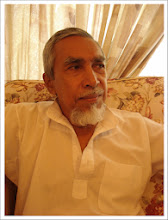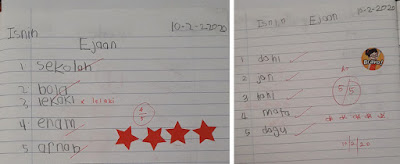“The first day or so we all pointed to our countries. The
third or fourth day we were pointing to our continents. By the fifth day we
were only aware of one Earth.” – Sultan bin Salman bin Abdul-Aziz Al Saud
1. Tiny Earth! It was just a tiny speck in the
vastness of outer space. That’s what a NASA photo showed in an internet report on my mobile. The image was snapped by
Voyager 1 spacecraft more than 30 years ago.
2. At first my septuagenarian eyesight was
incapable of beholding the tiny speck, so I stretched the photo with my thumb
and index finger and barely caught sight of a tiny dot. How amazing!
3. The tiny dot seemed all alone in the vast
emptiness of space, but in actuality it was never alone. It is part of the
solar system orbiting the sun along with seven other planets.
4. According to the report Voyager 1 took the picture
at a distance of 4 billion miles (6.4 billion kilometres) from Earth as the
spacecraft was heading out of the solar system. By now it is reportedly deep in
interstellar space at more than 13 billion miles distant.
5. I enjoy reading about the cosmos, galaxies, stars and planets, the
mysterious black holes, dark matter and whatnot. Many articles and reports on
the internet about the subjects are worthy of note but the physics and mathematics
are beyond me.
6. So I might as well leave science aside and
contemplate the cosmos with my layman’s mind. I’ve long realised that I can
never understand the reality of the cosmos except that I can only wonder at its
majesty and mystery.
7. Just imagine the vastness of our solar
system alone. It is but a dot within the vast spiral structure of the Milky Way
galaxy which has four main arms emanating from its centre. Amid the arms there are smaller
spurs. The sun and the solar system reside
on the inner edge of one of the spurs known as the Orion Arm, about 26,000 light-years from the
galactic centre.
8. It’s a
wonder how creation exists in order and harmony. The Milky Way is constantly rotating and the arms are moving
through space. The sun and the solar system travel with them. Apparently nothing escapes the connectedness of all
things in this universe. A
famous naturalist, John Muir, once wrote: “When we try to pick out anything by
itself, we find it hitched to everything else in the universe.”
9. I’m not being cynical, but I believe no
amount of science is capable of explaining the mystery of creation through our
entire existence. As a Spanish neuroscientist, Santiago Ramón y Cajal, put it, “As long as our brain is a mystery, the
universe, the reflection of the structure of the brain will also be a mystery.”
10. It follows that destiny remains a
mystery of creation. A professor of evolutionary cosmology wrote: “There is nothing more mysterious than destiny – of a person, of our species, of our planet, or of the
universe itself.”
11.It is
enigmatic how destiny connects people as gravity connects the sun and the
planets. As an ancient Chinese proverb says, “An invisible thread connects
those who are destined to meet. Regardless of time, place and circumstance. The
thread may stretch or tangle. But it will never break.” This seems to tie in
with the following episodes.
12. My father and one of his schoolmates were
from George Town, Penang, but eventually finished up in Alor Star until they
breathed their last. In their teens both were destined to become teachers at
their old school, the Penang Free School.
13. Later in 1910, my father’s schoolmate was
appointed as the first headmaster of a newly founded English school in Alor
Star, but only for a brief spell. Soon my father took over as headmaster of the
school in early 1911.
14. Thenceforward my father and his schoolmate
moved along separate paths in pursuing their destiny. The latter would one day
be blessed with a son destined to become a great man in the country. And it was
fated that my father would have no children from his first and second marriage,
but miraculously he became a father in his middle 60s after marrying my mother.
15. My father’s second marriage is worthy of
note by reason of relationships on his wife’s side. He married a widow who had
a son who was married to his cousin who had a younger brother who was destined
to be an important figure in the country.
16. As years passed by and long after the son
of my father’s schoolmate had fulfilled his great destiny, I had the
opportunity of being called for appointments with the eminent citizen on two
occasions.
17. On the first occasion I accompanied my
sister who sought his advice and help over a private matter. We showed him
proofs of our identity and he seemed pleased and convinced.
18. On the second occasion I was accompanied by
my wife and the first thing he mentioned was that the appointment was fixed up
by reason of the name Ismail Merican, saying that he remembered him for his
meritorious services to the state of Kedah.
19. I was very pleased with the remarks made
about my father by the eminent citizen who was the son of his schoolmate. And as
I was introducing my wife to him she mentioned that her father was a cousin of
his brother’s wife. “Small world,” I noted and he took it with a slight nod and
a faint smile.
20. As for the “important figure” that I’ve
mentioned above, he was appointed to a high government office by the son of my
father’s schoolmate for a period of time. Not many months ago someone very dear
to me recounted that the mention of my father’s name was lost to him. It seemed
that to some people certain parts of history are not as memorable.
Note: To better appreciate this article, see my
posts “My father’s subsequent marriages,” “The appointment” and “Pandora’s box”
published on 10
October 2016, 18 October 1918 and 7
January 2020 respectively.































